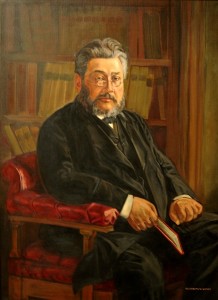 Justin Taylor writes: Paul Miller made a comment that has stuck with me: he mentioned that he’s recently been noting the number of things in the Psalmists’ prayers that he doesn’t say in his own prayers.
Justin Taylor writes: Paul Miller made a comment that has stuck with me: he mentioned that he’s recently been noting the number of things in the Psalmists’ prayers that he doesn’t say in his own prayers.
With that in mind, note the basis upon which these prayers are made:
Jeremiah 14:7
Though our iniquities testify against us,
act, O LORD, for your name’s sake;
for our backslidings are many;
we have sinned against you.
Jeremiah 14:21
Do not spurn us, for your name’s sake;
do not dishonor your glorious throne;
remember and do not break your covenant with us.
Daniel 9:19
O Lord, hear; O Lord, forgive.
O Lord, pay attention and act.
Delay not, for your own sake, O my God, because your city and your people are called by your name.
A few observations about this phrase as found in God’s word:
1. The name of God is God’s revelation of himself.
2. In the phrase “for the sake of God’s name,” “name” is essentially synonymous with “praise” and “glory.” Isaiah 48:9 puts “the sake of my name” parallel with “the sake of my praise.” Isaiah 48:11 puts “my name” on the same level as “my glory.”
3. God’s great name can be glorified or profaned (see especially Ezekiel 20).
4. God works for both his glory and our good (compare, for example, Rom. 8:28 and Rom. 11:36), but the Bible puts a priority on God’s interest over ours as the basis for his action (frequently saying “not for our sake” but for “your sake”).
5. In our prayers we should appeal to God, reminding God of what he cannot forget: to do all things for the glory and praise of his great name.
The following is not quite exhaustive, but here is a catalog of the main uses of the phrase in the Bible.
1 Samuel 12:22
For the LORD will not forsake his people, for his great name’s sake, because it has pleased the Lord to make you a people for himself.
Psalm 23:3
He restores my soul.
He leads me in paths of righteousness1
for his name’s sake.
Psalm 25:11
For your name’s sake, O LORD,
pardon my guilt, for it is great.
Psalm 31:3
For you are my rock and my fortress;
and for your name’s sake you lead me and guide me;
Psalm 79:9
Help us, O God of our salvation,
for the glory of your name;
deliver us, and atone for our sins,
for your name’s sake!
Psalm 106:8
Yet he saved them for his name’s sake,
that he might make known his mighty power.
Psalm 109:21
But you, O God my Lord,
deal on my behalf for your name’s sake;
because your steadfast love is good, deliver me!
Psalm 143:11
For your name’s sake, O LORD, preserve my life!
In your righteousness bring my soul out of trouble!
Isaiah 48:9, 11
For my name’s sake I defer my anger,
for the sake of my praise I restrain it for you,
that I may not cut you off. . . .
For my own sake, for my own sake, I do it,
for how should my name be profaned?
My glory I will not give to another.
Ezekiel 20:9
But I acted for the sake of my name, that it should not be profaned in the sight of the nations among whom they lived, in whose sight I made myself known to them in bringing them out of the land of Egypt.
Ezekiel 20:14
But I acted for the sake of my name, that it should not be profaned in the sight of the nations, in whose sight I had brought them out.
Ezekiel 20:22
But I withheld my hand and acted for the sake of my name, that it should not be profaned in the sight of the nations, in whose sight I had brought them out.
Ezekiel 20:44
And you shall know that I am the LORD, when I deal with you for my name’s sake, not according to your evil ways, nor according to your corrupt deeds, O house of Israel, declares the Lord GOD.
Ezekiel 36:22
Thus says the Lord GOD: It is not for your sake, O house of Israel, that I am about to act, but for the sake of my holy name, which you have profaned among the nations to which you came.
The New Testament also uses this language, with Jesus frequently applying it to his own name.
Matthew 10:22
. . . and you will be hated by all for my name’s sake. But the one who endures to the end will be saved.
Matthew 19:29
And everyone who has left houses or brothers or sisters or father or mother or children or lands, for my name’s sake, will receive a hundredfold and will inherit eternal life.
Matthew 24:9
Then they will deliver you up to tribulation and put you to death, and you will be hated by all nations for my name’s sake.
Acts 9:16
For I will show him how much he must suffer for the sake of my name.
Romans 1:5
through whom we have received grace and apostleship to bring about the obedience of faith for the sake of his name among all the nations.
1 John 2:12
I am writing to you, little children, because your sins are forgiven for his name’s sake.
3 John 1:7
For they have gone out for the sake of the name, accepting nothing from the Gentiles.
Revelation 2:3
I know you are enduring patiently and bearing up for my name’s sake, and you have not grown weary.
 9 Ways to Pray for Churches and Pastors, found in the 9Marks 2013 report:
9 Ways to Pray for Churches and Pastors, found in the 9Marks 2013 report:
 Do my personal prayers make any difference?
Do my personal prayers make any difference? In the 1990s Pastor Jim Cymbala’s oldest daughter Chrissy was far from God, and had been for two and half years. In Fresh Fire, Jim tells the story of what happened.
In the 1990s Pastor Jim Cymbala’s oldest daughter Chrissy was far from God, and had been for two and half years. In Fresh Fire, Jim tells the story of what happened. Wednesday, April 28.
Wednesday, April 28.
 by Dr. John Piper, Website: www.desiringGod.org. Email: mail@desiringGod.org. Toll Free: 1.888.346.4700.
by Dr. John Piper, Website: www.desiringGod.org. Email: mail@desiringGod.org. Toll Free: 1.888.346.4700.
 Justin Taylor writes: Paul Miller made a comment that has stuck with me: he mentioned that he’s recently been noting the number of things in the Psalmists’ prayers that he doesn’t say in his own prayers.
Justin Taylor writes: Paul Miller made a comment that has stuck with me: he mentioned that he’s recently been noting the number of things in the Psalmists’ prayers that he doesn’t say in his own prayers.